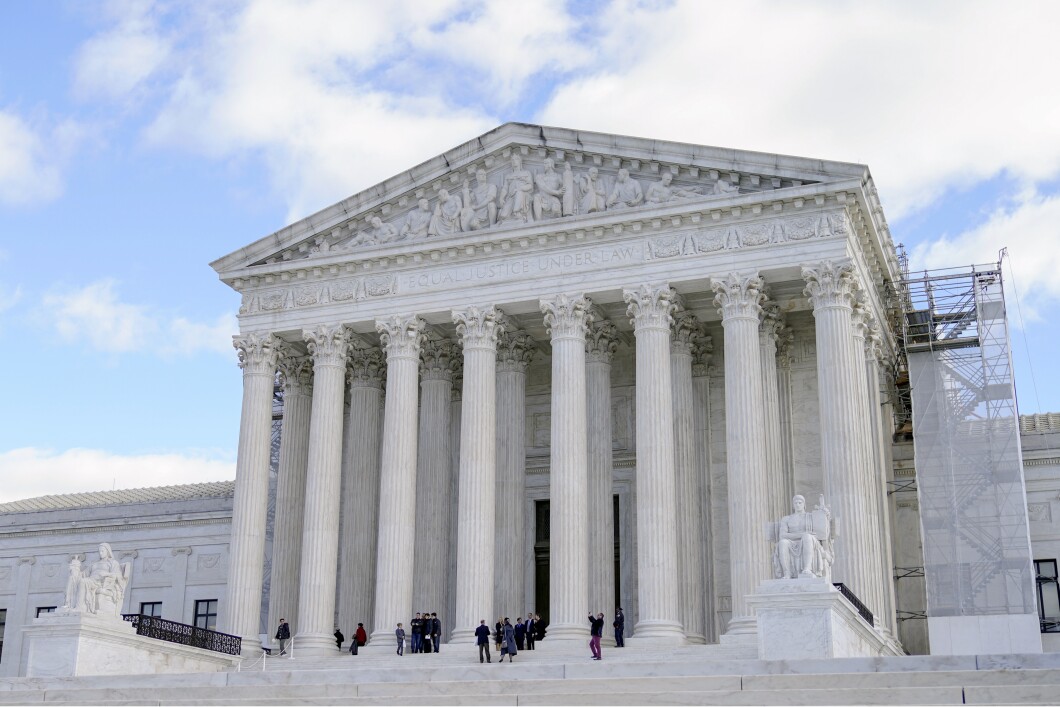
All eyes are on the Supreme Court now that former President Donald Trump has been found ineligible on two state primary election ballots for the 2024 race, prompting confidence among legal experts that the nine justices will resolve the unprecedented dilemma.
The Colorado Supreme Court on Dec. 19 ruled Trump ineligible to serve as president again under Section 3 of the 14th Amendment, which includes a clause that blocks anyone who has “engaged in insurrection or rebellion” against the government from holding elected office if they had previously taken an oath “to support the Constitution of the United States.”
TRUMP CAN APPEAR ON CALIFORNIA BALLOTS AS DEMOCRATIC OFFICIAL BREAKS WITH COLORADO AND MAINE
Maine‘s Democratic secretary of state made a similar decision Wednesday night, absent any court review. Meanwhile, both Michigan and Minnesota high courts have allowed Trump to remain on primary ballots, and California‘s secretary of state decided this week that the former president could remain on the primary ballot.

This unequal tapestry of results has prompted most legal experts to expect that the nation’s highest court will have no other choice but to weigh in on the dispute.
Doug Spencer, a law professor at the University of Colorado, told the Washington Examiner this week that “The Colorado case definitely increased the likelihood that the U.S. Supreme Court will intervene,” but pushed back on the notion that other states making separate or similar decisions would nudge the justices toward considering the 4-3 judgment from the Colorado Supreme Court.
“It’s true that the Supreme Court often takes up cases when there is a divide among the federal circuits. But the same is not true when there is a divide among state Supreme Courts. That is especially true when, as is the case here, the cases are decided on state law grounds,” Spencer said.
One reason why the high court’s intervention seems inevitable is the divergent legal viewpoints about whether Trump is required to be found guilty of the crime of “insurrection” before he can be deemed constitutionally ineligible for having “engaged” in one.
Maine Secretary of State Shenna Bellows conceded in her written decision there would have been an easier jump to her conclusion if Trump was found guilty or not guilty of that crime in a court of law. She ultimately took the evidence that was presented by the House Jan. 6 committee, among other reports, and determined Trump ineligible. To be sure, California’s secretary of state found that Trump couldn’t be removed, and Oregon’s secretary of state is being sued by a liberal group because they opted not to remove Trump.
Notably, both the Colorado and Maine decisions are on hold pending appeal, so Trump is still technically going to be on the ballot for now.
And Bellows also conceded that the highest court would likely be the final arbiter over Maine’s decision. Professor Ray Brescia of Albany Law School told the Washington Examiner he believes the high court is bound to take up one of the disputes soon, most likely the Colorado case.
“Ultimately this is just going to have to be decided by the Supreme Court,” Brescia said, adding that’s in part because of all the “different procedural postures” these ballot challenges against Trump are stemming from.
For example, Maine law holds that voters must first petition the secretary of state with challenges to a candidate’s qualifications for office, and then a public hearing is held where the challengers must make their case as to why the primary nomination should be invalidated. In Colorado, the challenge first had to undergo a five-day trial before a judge concluded Trump could remain on the primary ballot, which was later reversed by the state’s top court.
Brescia said the wide range of procedural postures behind the varying state challenges presents a potential for the high court to “rule on sort of narrow procedural grounds,” which could serve as a means to avoid rulings that could be attacked as judicial activism.
“[It] sort of opens the door for the Supreme Court to sort of duck the obviously politically charged question of whether the former president is barred by the 14th Amendment from running again,” Brescia said, comparing a hypothetical Supreme Court ruling over the ballot dispute to the way the court ruled in the 2000 case Bush v. Gore.
Without getting into the merits of the case, Brescia made the point that the challengers against Trump’s eligibility appear to have a higher burden than Trump’s efforts to remain on the ballot.
“It is much harder for the people who want to keep the former president off the ballot to win before the Supreme Court than it is for people who want him to stay on it,” Brescia said, making an analogy to a “triple bank shot” move in billiards.
“I think this is a triple bank shot where you’re sort of trying to jump the cue ball onto a neighboring table,” Brescia joked.
Additionally, another potential way for the high court to avoid wading into a messy political quagmire is relying on a pattern that was observed in Trump’s 2020 election petitions after he lost to then-candidate Joe Biden, as many of those challenges were dismissed due to concerns about meeting safe harbor deadlines to certify state election results.
“You could absolutely see the calendar of the 2024 elections stalking these cases, and the Supreme Court could issue decisions in these cases that basically allows the calendar to drive the issue,” Brescia added.
So far, the Colorado Republican Party has filed an appeal of the state Supreme Court’s removal of Trump. The group seeking Trump’s permanent ballot elimination, Citizens for Responsibility and Ethics in Washington, has urged the Supreme Court to make a speedy review, noting that Colorado has a written deadline to certify candidates for ballots by Jan. 5.
Trump is expected to file his appeal this week.
Another route for the Supreme Court to take in the Colorado case could be an indefinite stay, or a hold on the state Supreme Court decision until after the 2024 general election.
CLICK HERE TO READ MORE FROM THE WASHINGTON EXAMINER
Brescia explained that it is always possible that the Supreme Court “could simply slow walk these cases for an indefinite period of time, perhaps out of a desire among the justices that the issue becomes essentially moot.”
If the Supreme Court intervenes and overturns the decisions in Colorado or Maine, Trump will appear on the general election ballot against his likely Democratic rival, President Joe Biden.




